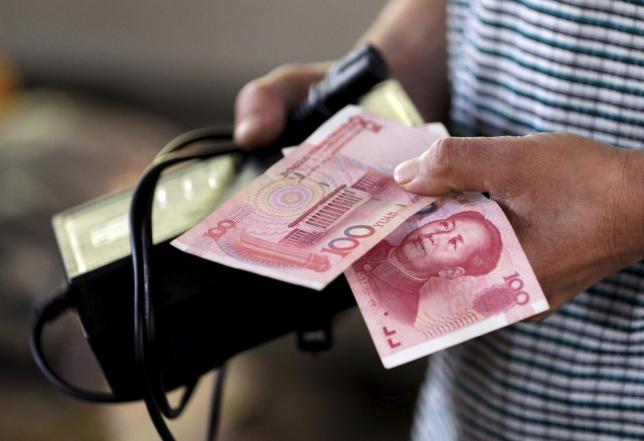China central bank tries to soothe global markets, says no basis for yuan to fall further

BEIJING - China's central bank said on Thursday that there was no basis for further depreciation in the yuan given strong economic fundamentals, in a bid to reassure jittery global markets after it devalued the currency earlier in the week.
As the yuan fell for the third straight day, the People's Bank of China (PBOC) said the country's strong economic environment, sustained trade surplus, sound fiscal position and deep foreign exchange reserves provided "strong support" to the exchange rate CNY=CFXS.
China's decision to devalue the currency on Tuesday by pushing its official guidance rate down 2 percent sparked fears of a "currency war" and roiled global financial markets, dragging other Asian currencies to multi-year lows.
It also drew accusations from U.S. politicians that Beijing was unfairly supporting its exporters.
The PBOC said at the time that the move was a one-off depreciation, but sources involved in the Chinese policy-making process told Reuters that powerful voices within government were pushing for the yuan to go still lower, suggesting pressure for an overall devaluation of almost 10 percent.
PBOC Vice-governor Yi Gang dismissed such talk as groundless.
But even if the central bank succeeds in putting a new floor under the yuan for now, weak July economic data and expectations of more interest rate cuts later in the year are likely to fuel expectations that authorities could allow it to slip further.
REFORMS AT RISK?
Fitch ratings agency said on Thursday that the depreciation in the yuan "highlights wider pressures on the economy", but also demonstrated that authorities remained committed to market-oriented reform, a commitment that many had questioned after Beijing's heavy-handed interventions to stem a plunge in its stock markets in June.
Vice-governor Yi said China would quicken the opening of its foreign exchange market and would attract more foreign investors as it liberalises its financial markets.
Officials said the PBOC had stopped "regularly" intervening in the foreign exchange market but allowed that it could conduct "effective management" of the yuan in cases of extreme volatility.
Traders said major state banks had been buying yuan and selling dollars on Wednesday, causing the exchange rate to recover sharply in late trade, which influences the PBOC's official guidance rate for the following day.
Though the yuan opened slightly weaker on Thursday, the gap between the guidance rate and the traded spot market rate closed sharply as the central bank tried to slow a sharp sell-off that has knocked around 3.2 percent off the currency since Monday's close.
The PBOC set the guidance rate CNY=SAEC at 6.4010 per dollar prior to the market open, weaker than the previous fix of 6.3306.
The spot market CNY=CFXS opened at 6.3880 and was changing hands at 6.4076 after the PBOC comments, 206 pips weaker than the previous day's close and only 0.1 percent away from the guidance point, the closest it has traded to the guidance rate since November 2014.
The spot rate is currently allowed to trade within a range of 2 percent above or below the official fixing on any given day, and had been consistently trading over 1 percent weaker than the midpoint since March.
The offshore yuan was trading 1.02 percent weaker than the onshore spot at 6.4764 per dollar.
ECONOMY LOSING STEAM
Tuesday's yuan devaluation followed a run of poor economic data and resulted in the biggest one-day fall since 1994, raising market suspicions that China was embarking on a longer-term depreciation of its exchange rate that would make Chinese exports cheaper.
Data on Chinese factory activity growth and retail sales on Wednesday underlined sluggish growth in the world's second-largest economy, while fiscal expenditures jumped 24.1 percent in July, reflecting Beijing's efforts to stimulate economic activity.
Weighed down by weak exports, sluggish domestic demand and a cooling property market, growth in the world's second-largest economy is expected to slow from 7.4 percent in 2014 to 7 percent this year, its slowest pace in a quarter of a century.
The PBOC also said on Thursday that it would monitor "abnormal" cross-border flows after the devaluation raised fears that investors would seek to pull capital out of China in anticipation of further falls in the currency. -Reuters







